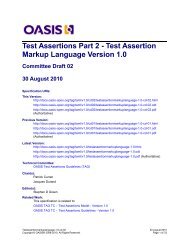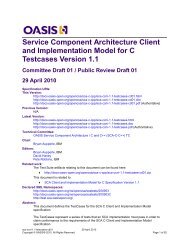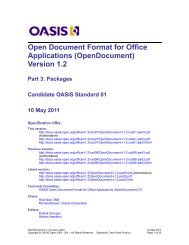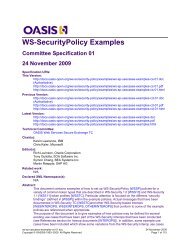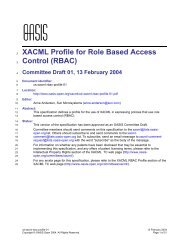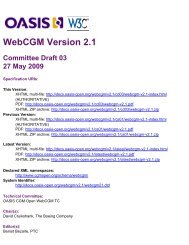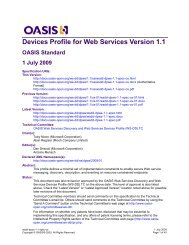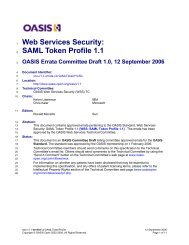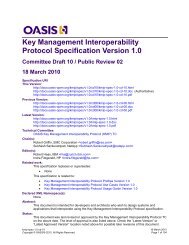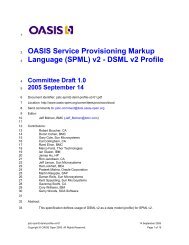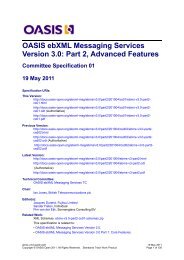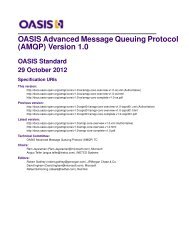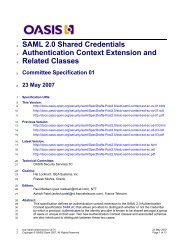- Page 1 and 2:
Content Management Interoperability
- Page 3 and 4:
Notices Copyright © OASIS Open 201
- Page 5 and 6:
2.1.12 Access Control . . . . . . .
- Page 7 and 8:
3.3.1 CMIS Atom . . . . . . . . . .
- Page 9 and 10:
4.3.1 updateProperties and checkIn
- Page 11 and 12:
B.2 A subset of JSONSchema . . . .
- Page 13 and 14:
[RFC4287] [RFC4288] [RFC4627] [RFC4
- Page 15 and 16:
1.5.7 Service bulkUpdateProperties
- Page 17 and 18:
capabilityOrderBy Indicates the ord
- Page 19 and 20:
ACL Capabilities • queryName •
- Page 21 and 22:
MAY also have one or more rendition
- Page 23 and 24:
2.1.3 Object-Type An object-type de
- Page 25 and 26:
fileable Boolean Indicates whether
- Page 27 and 28:
updatability Enum Indicates under w
- Page 29 and 30:
maxValue Integer The maximum value
- Page 31 and 32:
2.1.4 Document Object Document obje
- Page 33 and 34:
2.1.4.3 Document Object-Type Defini
- Page 35 and 36:
cmis:name Property Type: Inherited:
- Page 37 and 38:
cmis:createdBy Property Type: Inher
- Page 39 and 40:
cmis:isImmutable Property Type: Inh
- Page 41 and 42:
cmis:isPrivateWorkingCopy Property
- Page 43 and 44:
cmis:versionSeriesCheckedOutBy Prop
- Page 45 and 46:
cmis:contentStreamMimeType Property
- Page 47 and 48:
2.1.5 Folder Object A folder object
- Page 49 and 50:
A Folder Graph Root Folder A folder
- Page 51 and 52:
controllablePolicy Value: controll
- Page 53 and 54:
cmis:objectTypeId Property Type: In
- Page 55 and 56:
cmis:changeToken Property Type: Inh
- Page 57 and 58:
2.1.6 Relationship Object A relatio
- Page 59 and 60:
fileable Value: FALSE queryable Val
- Page 61 and 62:
cmis:objectTypeId Property Type: In
- Page 63 and 64:
cmis:changeToken Property Type: Inh
- Page 65 and 66:
2.1.7 Policy Object A policy object
- Page 67 and 68:
2.1.7.1.2 Property Definitions The
- Page 69 and 70:
cmis:secondaryObjectTypeIds Propert
- Page 71 and 72:
cmis:policyText Property Type: Inhe
- Page 73 and 74:
fileable Value: queryable Value:
- Page 75 and 76:
cmis:objectTypeId Property Type: In
- Page 77 and 78:
cmis:changeToken Property Type: Inh
- Page 79 and 80:
2.1.9.2.1 Attribute Values The seco
- Page 81 and 82:
2.1.10 Object-Type Creation, Modifi
- Page 83 and 84:
CMIS Object cmis:objectId : Id cmis
- Page 85 and 86:
2.1.12 Access Control A repository
- Page 87 and 88:
For convenience, the list groups al
- Page 89 and 90:
canGetProperties Description: Base
- Page 91 and 92:
Description: Base Type: Operand: Ke
- Page 93 and 94:
canApplyPolicy Description: Base Ty
- Page 95 and 96:
2.1.13 Versioning CMIS supports ver
- Page 97 and 98:
2.1.13.5.3 Discarding Check out An
- Page 99 and 100:
The repository MAY also create new
- Page 101 and 102:
2.1.14 Query CMIS provides a type-b
- Page 103 and 104:
Query Search Scope B is a subtype o
- Page 105 and 106:
ANY [ NOT ] IN "(" ")" ::= CONTA
- Page 107 and 108:
Property Type Operators supported o
- Page 109 and 110:
Usage: This is a predicate function
- Page 111 and 112:
Inputs: The value of this optional
- Page 113 and 114:
2.1.15 Change Log CMIS provides a "
- Page 115 and 116:
2.1.16 Retentions and Holds Retenti
- Page 117 and 118:
cmis:secondary cmis:rm_repMgtReten3
- Page 119 and 120:
If a repository supports Client Man
- Page 121 and 122:
queryable Value: SHOULD be TRUE con
- Page 123 and 124:
controllablePolicy Value: FALSE con
- Page 125 and 126:
description Value: creatable Value
- Page 127 and 128:
The CMIS service operations that su
- Page 129 and 130:
2.2.1.2.4.1 Rendition Filter Gramma
- Page 131 and 132:
Common CMIS properties: The followi
- Page 133 and 134:
versioning Intent: The operation is
- Page 135 and 136:
2.2.2.1 getRepositories Description
- Page 137 and 138:
asic Indicates that the CMIS basic
- Page 139 and 140:
2.2.2.4 getTypeDescendants Descript
- Page 141 and 142:
2.2.2.6 createType Description: Cre
- Page 143 and 144:
2.2.2.8 deleteType Description: Del
- Page 145 and 146:
2.2.3.1 getChildren Description: Ge
- Page 147 and 148:
2.2.3.2.3 Exceptions Thrown & Condi
- Page 149 and 150:
• invalidArgument If the service
- Page 151 and 152:
2.2.3.5 getObjectParents Descriptio
- Page 153 and 154:
2.2.4 Object Services CMIS provides
- Page 155 and 156:
• constraint If the contentStream
- Page 157 and 158:
• constraint If the versionable a
- Page 159 and 160:
2.2.4.4 createRelationship Descript
- Page 161 and 162:
2.2.4.6 createItem Description: Cre
- Page 163 and 164:
2.2.4.8 getObject Description: Gets
- Page 165 and 166:
2.2.4.10 getObjectByPath Descriptio
- Page 167 and 168:
2.2.4.12 getRenditions Description:
- Page 169 and 170:
2.2.4.14 bulkUpdateProperties Descr
- Page 171 and 172:
2.2.4.16 deleteObject Description:
- Page 173 and 174:
2.2.4.18 setContentStream Descripti
- Page 175 and 176:
2.2.4.20 deleteContentStream Descri
- Page 177 and 178:
2.2.5.1 addObjectToFolder Descripti
- Page 179 and 180:
2.2.6 Discovery Services The Discov
- Page 181 and 182:
2.2.6.1.3 Exceptions Thrown & Condi
- Page 183 and 184:
2.2.6.2.3 Exceptions Thrown & Condi
- Page 185 and 186:
2.2.7.1 checkOut Description: Creat
- Page 187 and 188:
2.2.7.3 checkIn Description: Checks
- Page 189 and 190:
2.2.7.5 getPropertiesOfLatestVersio
- Page 191 and 192:
2.2.8 Relationship Services The Rel
- Page 193 and 194:
2.2.8.1.3 Exceptions Thrown & Condi
- Page 195 and 196:
2.2.9.1 applyPolicy Description: Ap
- Page 197 and 198:
2.2.9.3 getAppliedPolicies Descript
- Page 199 and 200:
2.2.10.1 applyACL Description: Adds
- Page 201 and 202:
3 AtomPub Binding 3.1 Overview This
- Page 203 and 204:
3.1.9 Services not Exposed The foll
- Page 205 and 206:
• AtomPub Service (application/at
- Page 207 and 208:
3.4.1.1.1 cmisra:collectionType Thi
- Page 209 and 210:
href="http://example.com/rep1/rendi
- Page 211 and 212:
3.4.3.2 Hierarchy Navigation Intern
- Page 213 and 214:
http://docs.oasis-open.org/ns/cmis/
- Page 215 and 216:
When POSTing an Atom Document, the
- Page 217 and 218:
ACL Policy Rel Versioning Disc Mult
- Page 219 and 220:
- cmisra:collectiontype = 'update'
- Page 221 and 222:
• If the value is 'latest' getObj
- Page 223 and 224:
application/atom+xml;type=entry 3.
- Page 225 and 226:
first, next, previous, last Paging
- Page 227 and 228:
Arguments: Media Type: Link Relatio
- Page 229 and 230:
Success Status Codes: • 201 Creat
- Page 231 and 232:
service Points to the service docum
- Page 233 and 234:
• application/atom+xml;type=entry
- Page 235 and 236:
3.10.1.1 HTTP GET CMIS Services: Ar
- Page 237 and 238:
Arguments: Media Type: Link Relatio
- Page 239 and 240:
3.10.4.2 HTTP DELETE This deletes t
- Page 241 and 242:
• cmisra:type inside atom:entry S
- Page 243 and 244:
Media Type: Link Relations: • inc
- Page 245 and 246:
Arguments: Media Type: Media Type:
- Page 247 and 248:
Media Type: Link Relations: • inc
- Page 249 and 250:
self Points to an URI that returns
- Page 251 and 252:
Accept: Media Type: • Atom Entry
- Page 253 and 254:
3.11.8 Content Stream This is the c
- Page 255 and 256:
• onlyBasicPermissions Media Type
- Page 257 and 258:
4.3 Additions to the Services secti
- Page 259 and 260:
Client to Repository Repository to
- Page 261 and 262:
CMIS and JSON types. CMIS string bo
- Page 263 and 264:
5.2.9.2.1 JSONP and Form Requests C
- Page 265 and 266:
Example: GET /cmis/repository/123/m
- Page 267 and 268:
The Schema Elements mentioned in th
- Page 269 and 270: 5.4.2.3 Selector "typeDescendants"
- Page 271 and 272: 5.4.2.6 Action "createDocument" Ser
- Page 273 and 274: 5.4.2.10 Action "createItem" Servic
- Page 275 and 276: Example: Request: browser/doQuery-r
- Page 277 and 278: 5.4.2.18 Selector "lastResult" HTTP
- Page 279 and 280: 5.4.3.3 Selector "folderTree" Servi
- Page 281 and 282: 5.4.3.6 Selector "checkedout" Servi
- Page 283 and 284: 5.4.3.10 Action "createPolicy" Serv
- Page 285 and 286: 5.4.3.14 Selector "properties" Serv
- Page 287 and 288: 5.4.3.18 Action "update" Service: H
- Page 289 and 290: 5.4.3.22 Action "setContent" Servic
- Page 291 and 292: 5.4.3.26 Action "removeObjectFromFo
- Page 293 and 294: 5.4.3.30 Selector "object" Service:
- Page 295 and 296: 5.4.3.33 Selector "relationships" S
- Page 297 and 298: 5.4.3.37 Action "applyACL" Service:
- Page 299 and 300: Example: 5.4.4.3.2 Token This is u
- Page 301 and 302: 5.4.4.3.11 Single-value Properties
- Page 303 and 304: 5.4.4.3.16 Removing Access Cont
- Page 305 and 306: 5.4.4.3.22 Unfile Objects Indicates
- Page 307 and 308: 5.4.4.3.29.5 Include allowable acti
- Page 309 and 310: Web Browser https://foo.example.com
- Page 311 and 312: 5.4.4.4.1 Client Implementation Hin
- Page 313 and 314: Web Services Binding: Normative tex
- Page 315 and 316: Optional parameters: "charset": Thi
- Page 317 and 318: Published specification: This speci
- Page 319: B.3 A Non-Normative Tutorial A coll
- Page 323 and 324: string `{ "title": "Service Name",
- Page 325 and 326: B.4 The Normative Grammar Orderly_s
- Page 327 and 328: \b \f \n \r \t \u four-hex-digits j
- Page 329 and 330: Joyer, Mr. Neil Kadlabalu, Hareesh
- Page 331: CMIS-738 Add introduction sub-secti



